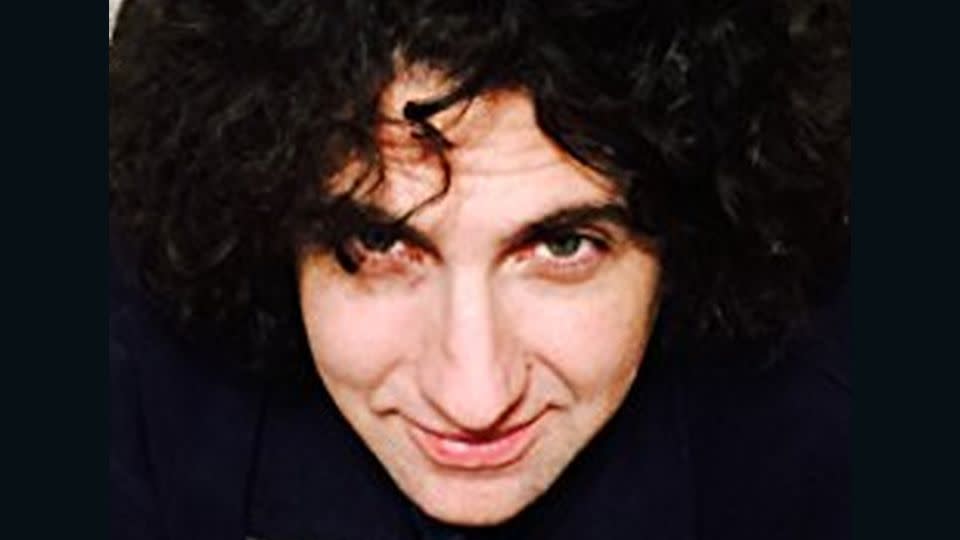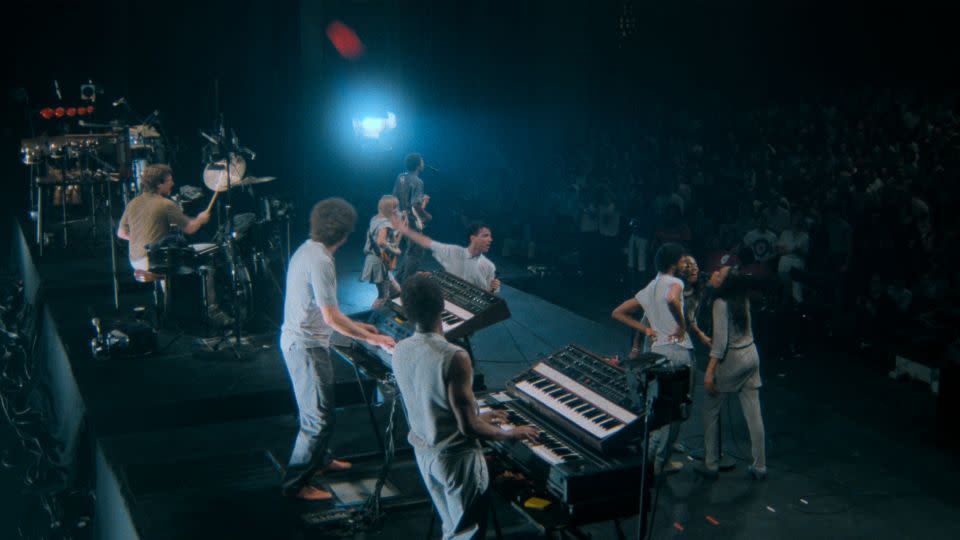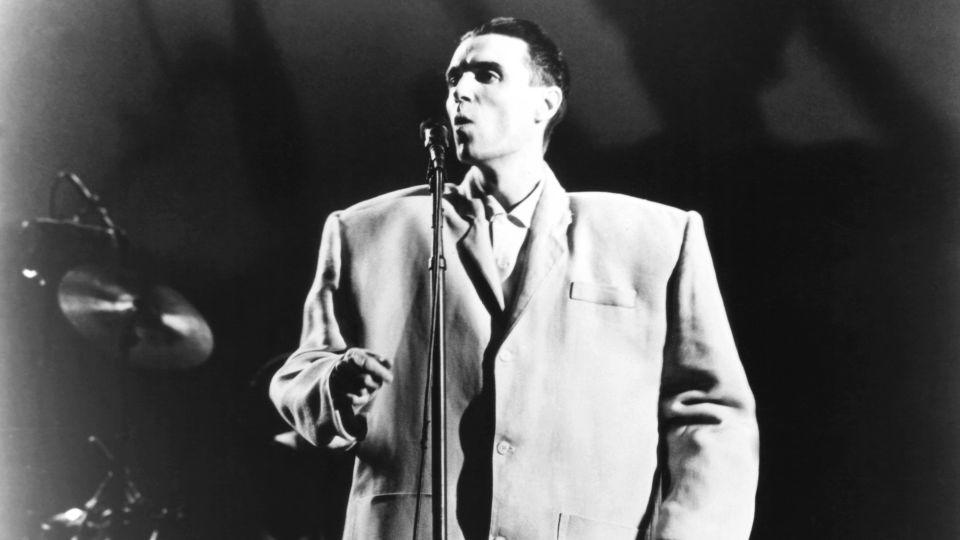Opinion: The band that talked back to Reagan is a balm for the Trump era
Editor’s Note: Noah Berlatsky (@nberlat) is a freelance writer in Chicago. The views expressed here are his own. View more opinion articles on CNN.
The Reagan years, with their anti-civil rights backlash and rising homophobia, were a famously repressive moment. And in response, they called forth some famously righteous music: The Dead Kennedys’ “Nazi Punks F–k Off”; The Dicks’ “The Dicks Hate the Police,” Public Enemy’s “Don’t Believe the Hype,” N.W.A’s “F–k tha Police.”

One 1980s band that isn’t usually thought of as especially political is The Talking Heads. But A24’s newly restored 40th anniversary print of the band’s legendary concert film “Stop Making Sense” feels like a moment for a reappraisal. Talking Heads’ lyrics are undeniably more elliptical than N.W.A.’s or the Dead Kennedys’. But in 1984, a performance of such angular oddity, and such joy, was an implicit rebuke to the Reagan era.
Now, in its 2023 debut for a new generation, the move is a rebuke to the Trump era as well. Former President Donald Trump is sometimes characterized as a departure from the Reagan GOP; he’s even grumbled about the choice of the Reagan Library as the choice for the second Republican primary debate, which he’s not expected to attend.
But Trump can also be seen as a fulfillment of movement conservative trends that Reagan started. Reagan (like Trump) eagerly stoked fears of anti-White racism; Reagan, (like Trump) built his coalition on White evangelicals and their obsession with patriarchal hierarchy, homophobia and curtailing reproductive rights. The cramped resentment of cosmopolitan diversity has been at the core of the GOP for a long time.
Formed in the late 1970s, The Talking Heads are an iconic part of the New Wave — a subgenre that added synthesizers and stiff dance floor rhythms to guitar rock’s blues base. The bands most associated with New Wave — Devo, Blondie, Joy Division, The Human League — are mostly White, and their lyrics focus on themes of alienation and dehumanization. Their political mode was more satire than protest.
“Stop Making Sense” starts off within the bounds of that New Wave approach. Director Jonathan Demme chose to defy concert film tradition and have minimal crowd scenes; for the most part the camera is focused squarely on the stage.

The first thing that the camera shows is lead singer David Byrne as he walks up to the microphone alone and launches into The Talking Heads’ early hit “Psycho Killer.” “I can’t seem to face up to the facts / I’m tense and nervous and I can’t relax,” Byrne half-whines, half-yodels while a boom box provides canned beats. It’s an incredibly catchy ode to paranoia and inadequacy, and Byrne stumbles around the stage like a malfunctioning android ectomorph.
Byrne’s idiosyncratic dancing and physical appearance are central to “Stop Making Sense,” and he never stops being malfunctioning, android or ectomorph. But he does stop being alone. Song after song, one by one, more people come out to join him onstage. First are the original members — Tina Weymouth on bass, Chris Frantz on drums, Jerry Harrison on keyboards and guitar. But in the early 1980s, the band had increasingly picked up Black influences — George Clinton, James Brown, Fela Kuti — and that entailed picking up more performers as well. “Stop Making Sense” included singers Lynn Mabry and Ednah Hold, legendary Parliament-Funkadelic keyboardist Bernie Worrell, percussionist Steve Scales and The Brothers Johnson guitarist Alex Weir.
The entire ensemble unleashed is a bizarre juggernaut of unhinged funk. “Burning Down the House” is absolutely titanic, as Harrison and Scales lock into polyphonic ricochets of rhythm so thunderous you have to blink to make sure the stage hasn’t actually been hit by lightning and erupted into flames.
Byrne seems to be powered by batteries and sweat as he quivers and vibrates all over the screen. But Weir is determined to keep up, running in place like he’s on a treadmill, lifting his legs a little higher than Byrne’s just to show he can. Mabry and Hold are equally kinetic, and they’re not relegated off to the usual background singer circle, 15 feet from fame. Harrison, Byrne and Weymouth all take a moment off to dance with them, and on the transcendent, Motown-esque “This Must Be the Place” they move center stage, joining in exquisite three-part harmonies as Byrne dances with a floor lamp and cries, “I feel numb / burn with a weak heart / I guess I must be having fun.”

As those lines suggest, The Talking Heads’ lyrics never stop being about angst and anxiety; Byrne and company want you to know they feel like broken things in a broken land. But when those lyrics are belted out in the middle of such a riotous party, they feel less like a call for help and more like a statement of purpose.
That’s perhaps most vivid in the amazing performance of “Once in a Lifetime,” in which suburban ennui is transmuted into cock-eyed transcendence. “You may ask yourself, how did I get here?” hits with the rapturous force of Sly and the Family Stone’s “Everyday People” — weirdos of every race and gender crawling out of those little boxes and doing backstroke in the “water / flowing underground.”
There are lots of other highlights — Worrell’s keyboard almost launching into some broken funk version of the National Anthem on “Making Flippy Floppy”; Tina Weymouth getting to jump about like a busted marionette for her one lead performance on “Genius of Love”; Byrne coming out in a huge suit that’s both a parody of the company man and a tribute to Cab Calloway zoot suites past; Mabry and Hold’s gospel-tinged opening and Weir’s Hendrixoid solo, on the Al Green classic “Take Me to the River.” For the Talking Heads, everything is silly, everything is cool, everything is incredibly accomplished and yet everything sounds like it doesn’t fit together quite right. The band takes despair and misery and turns it effortlessly into the funkiest kind of love.
The closest Byrne comes to confronting the Reagan-era’s fusion of Christianity with repressive politics is probably the song “Heaven,” in which the promised afterlife is a sterile wasteland (“Heaven is a place/where nothing/nothing ever happens.”) But while the concert film may not mention fascism, or Reagan, directly, it’s an open celebration of everything those in power at the time hated — cosmopolitan integration, idiosyncratic weirdness. This was a New Wave steeped in Afrofuturism; its vision of tomorrow is nerdy and unsegregated and the music blasts so loud you can’t even hear Big Brother.
Reagan’s gone, but aspects of his legacy live on in our culture and our politics — notably, as I was reminded while watching “Stop Making Sense,” in the way Trump and his ilk want us all docile in our own boxes, hoping in vain for a future exactly like the past, but blander. In that context, this film just makes more sense the longer it jerks and herks there, wrong but right, onscreen.
For more CNN news and newsletters create an account at CNN.com

